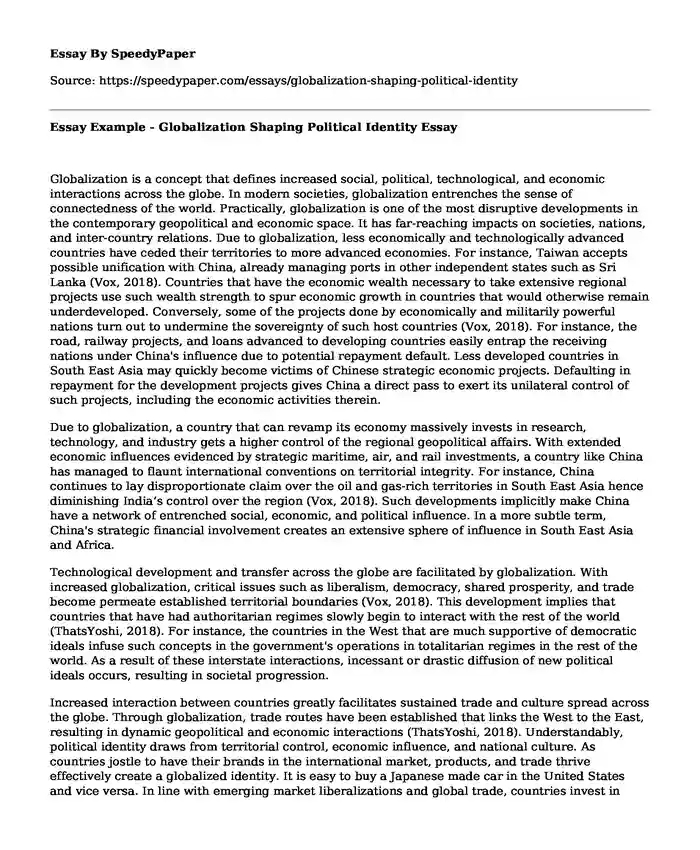
| Type of paper: | Essay |
| Categories: | Globalization Politics International relations Asia |
| Pages: | 3 |
| Wordcount: | 586 words |
Globalization is a concept that defines increased social, political, technological, and economic interactions across the globe. In modern societies, globalization entrenches the sense of connectedness of the world. Practically, globalization is one of the most disruptive developments in the contemporary geopolitical and economic space. It has far-reaching impacts on societies, nations, and inter-country relations. Due to globalization, less economically and technologically advanced countries have ceded their territories to more advanced economies. For instance, Taiwan accepts possible unification with China, already managing ports in other independent states such as Sri Lanka (Vox, 2018). Countries that have the economic wealth necessary to take extensive regional projects use such wealth strength to spur economic growth in countries that would otherwise remain underdeveloped. Conversely, some of the projects done by economically and militarily powerful nations turn out to undermine the sovereignty of such host countries (Vox, 2018). For instance, the road, railway projects, and loans advanced to developing countries easily entrap the receiving nations under China's influence due to potential repayment default. Less developed countries in South East Asia may quickly become victims of Chinese strategic economic projects. Defaulting in repayment for the development projects gives China a direct pass to exert its unilateral control of such projects, including the economic activities therein.
Due to globalization, a country that can revamp its economy massively invests in research, technology, and industry gets a higher control of the regional geopolitical affairs. With extended economic influences evidenced by strategic maritime, air, and rail investments, a country like China has managed to flaunt international conventions on territorial integrity. For instance, China continues to lay disproportionate claim over the oil and gas-rich territories in South East Asia hence diminishing India’s control over the region (Vox, 2018). Such developments implicitly make China have a network of entrenched social, economic, and political influence. In a more subtle term, China's strategic financial involvement creates an extensive sphere of influence in South East Asia and Africa.
Technological development and transfer across the globe are facilitated by globalization. With increased globalization, critical issues such as liberalism, democracy, shared prosperity, and trade become permeate established territorial boundaries (Vox, 2018). This development implies that countries that have had authoritarian regimes slowly begin to interact with the rest of the world (ThatsYoshi, 2018). For instance, the countries in the West that are much supportive of democratic ideals infuse such concepts in the government's operations in totalitarian regimes in the rest of the world. As a result of these interstate interactions, incessant or drastic diffusion of new political ideals occurs, resulting in societal progression.
Increased interaction between countries greatly facilitates sustained trade and culture spread across the globe. Through globalization, trade routes have been established that links the West to the East, resulting in dynamic geopolitical and economic interactions (ThatsYoshi, 2018). Understandably, political identity draws from territorial control, economic influence, and national culture. As countries jostle to have their brands in the international market, products, and trade thrive effectively create a globalized identity. It is easy to buy a Japanese made car in the United States and vice versa. In line with emerging market liberalizations and global trade, countries invest in creating valuable commodities that can perform competitively in the international market. This trend effectively creates a platform where individual national brands spread and interact, resulting in a heterogeneous global identity.
References
Thats Yoshi. (2018 Oct 8). Globalization in Japan - Documentary | Subtitles | (EN | 1080p. [Video]. Youtube. https://www.youtube.com/watch?v=LHjKJDnPHn4
Vox. (2018 Apr 5). China's trillion-dollar plan to dominate global trade. [Video]. Youtube. https://www.youtube.com/watch?v=EvXROXiIpvQ&t=63s
Cite this page
Essay Example - Globalization Shaping Political Identity. (2023, Sep 25). Retrieved from https://speedypaper.net/essays/globalization-shaping-political-identity
Request Removal
If you are the original author of this essay and no longer wish to have it published on the SpeedyPaper website, please click below to request its removal:
- Essay Sample on the Effects of Technology on Manual Jobs
- Essay Example on Poverty in America
- The Internet as a Vital Tool for Political Campaigns, Free Essay in Politics
- Generation Change Paper Sample
- Personal Experience Essay Example: Chinese in America
- Essay Example. Employment Opportunities Related To the Business Field
- How Have Workplace Cultures Changed in Physical Sciences? Essay Example
Popular categories




